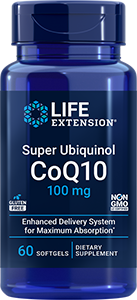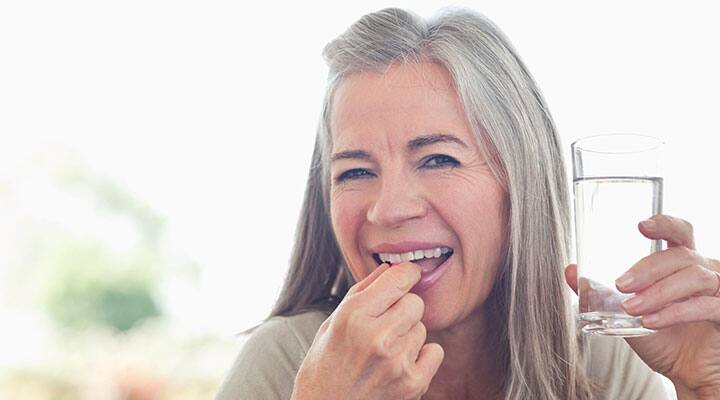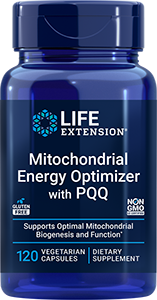
10 CoQ10 Benefits for Women You Should Know About
Published: January 2023
Coenzyme Q10 (CoQ10) is an essential energy-producing nutrient that the body makes naturally, and is present in every cell in the body. Well-known for its critical role in optimal health for both men and women, coenzyme Q10 is also beneficial for women focused on healthy fertility.
Your body can get CoQ10 from foods such as meat, fatty fish, cruciferous vegetables, nuts, seeds, legumes and fruits like strawberries and oranges, but dietary sources provide very little CoQ10. So, food shouldn't be your only source. Your body's coenzyme Q10 levels naturally decline as you age, so your body may not make enough of this essential nutrient over time. That makes supplementation with CoQ10 crucial.
Coenzyme Q10 has been extensively researched, and many meta-analysis studies and clinical trials support its broad spectrum of health benefits, including cardiovascular health, supporting already-healthy blood pressure, brain health and its anti-aging effects. The science shows that having coenzyme Q10 in your wellness arsenal can help you be proactive in fighting aging and supporting optimal health. This makes coenzyme Q10 a must for overall health and longevity. As always, you should check with your doctor to see if adding CoQ10 supplements is right for you. In the meantime, let's delve deeper into CoQ10 benefits.
Promotes healthy fertility
Protection from free radicals
Promotes heart health
A woman's fertility declines after age 35, making it more difficult to conceive. Your egg count and ovarian reserve naturally decline with age and in tandem with your CoQ10 levels. Supplementation with CoQ10 has been shown to protect eggs from oxidative stress, which can help certain women succeed in getting pregnant. Pro tip: Healthy estrogen levels are also essential if you're trying to conceive.
All cells in your body are vulnerable to molecules known as free radicals. This oxidative stress can impact women's eggs and a man's sperm—and much more. Free radicals can impact in your brain, heart, kidney and skin, interfering with their regular functioning.
Oxidative stress can also impact muscle function and muscle energy. CoQ10 can improve your exercise performance, as well as helping to keep all your cells working optimally as you get older.
CoQ10 supplementation supports a healthy cardiovascular system. It helps to maintain the integrity of heart muscle cells by helping to shield cells from oxidative stress. The heart has one of the highest energy requirements of all your organs. Coenzyme Q10 helps inhibit inflammation to promote heart health and supports the powerhouses of heart cells, the mitochondria.
CoQ10 also helps your body maintain already-healthy blood pressure and already-healthy cholesterol levels.
Promotes blood vessel and arterial health
Supports brain health
Promotes healthy insulin sensitivity
Promotes healthy skin
As we've seen so far, coenzyme Q10 is terrific for heart health. Another benefit CoQ10 provides to your ticker is blood vessel health support. That's because it helps maintain nitric oxide-related pathways—essential for vasodilation and healthy blood pressure—and helps protect the delicate inner lining of blood vessels and arteries against oxidative stress.
Your brain is one of your high-energy organs, along with your heart, kidneys, and liver. This means it needs a lot of energy (produced by the mitochondria) to function optimally—so, you'll find coenzyme Q10 concentrated in your noggin.
This high energy demand means your brain, with its high fatty acid content and oxygen demand, is susceptible to oxidative damage. One study in older individuals found that coenzyme Q10 levels were associated with cognitive functioning. CoQ10 supplementation helps your body counteract the deficiency of this vital nutrient you will experience as you age.
CoQ10 supplementation supports already-healthy glucose metabolism and healthy insulin sensitivity. This also supports already-healthy blood sugar levels.
Who doesn't want to age gracefully? Your skin is the largest organ in your body. And unfortunately, it is very susceptible to oxidative stress from environmental factors. Deficiencies in CoQ10 can make it harder to retain moisture, making you look older than you are. CoQ10 supplementation can assist your body in protecting your skin cells from free radicals. It also has anti-aging effects, promoting healthy, young-looking skin.
Promotes healthy metabolism
Suppose you have specific goals, like keeping your skin, heart and brain healthy as you age, or keeping off those extra pounds that seem to creep up on you every year as you get older. In that case, you must support your metabolism. Supplementing with CoQ10 promotes healthy cell-energizing mitochondrial function, which is needed by every cell in your body to keep your metabolism functioning at its prime.
Confers free radical protection
Your body is constantly subjected to stress, thanks to everything from poor lifestyle choices to environmental factors beyond your control. These stressors can accelerate the aging process. Coenzyme Q10 protects cells from the effects of the oxidative stress your body incurs daily. This protection helps keep your heart healthy and your brain sharp.
Encourages energy production
By acting as a mitochondrial energy production optimizer, coenzyme Q10 can positively support the brain, heart, skin and reproductive system—all essential to truly actualize our best selves. Older adults in particular may experience a CoQ10 deficiency and can benefit from coenzyme Q10 supplementation.
Explore Our Best COQ10 Supplements
How does coenzyme Q10 work in the body?
Coenzyme Q10 plays several vital roles in your body’s natural biological processes. Its broad spectrum of benefits stems from its powerful ability to protect cell membranes and mitochondrial DNA from oxidative stress. It’s also a superstar at supporting healthy energy production.
It's also terrific for longevity. The science of living longer starts with nutrition, which helps your body fight age-related declines in energy production, supporting optimal quality of life as you age. Having sufficient coenzyme Q10 levels for healthy mitochondrial function, a process that produces energy at the cellular level through adenosine triphosphate (ATP), is a nutritional must.
By practicing healthy lifestyle choices like eating balanced meals, getting regular exercise and restful sleep, and adding CoQ10 supplementation, you can harness the powerful benefits of this nutrient and revitalize your energy at the cellular level.
How do you know if you need CoQ10?
The health benefits of CoQ10 are profound. You want your body to be filled with nutrients that protect and energize your aging cells—and coenzyme Q10 is one of them.
The best way to know if you need to supplement with CoQ10 is to take a test to measure the coenzyme Q10 levels in your blood. The results will determine the most precise dose to maintain appropriate blood levels of this anti-aging powerhouse.
Pro tip: Because coenzyme Q10 production decreases with age, it is more important to add a CoQ10 dietary supplement to your regimen as you get older.
How much CoQ10 should a woman take?
Your body does not store CoQ10, so continual supplementation is essential to protect and energize your aging cells, especially as you get older, and your body produces less and less CoQ10 naturally. Oral supplementation with CoQ10 helps keep you youthful and promotes healthy longevity.
CoQ10 supplements come in two forms, ubiquinone and ubiquinol. Ubiquinol is the most abundant form in your body; it is fat-soluble and the most easily absorbed. It is generally more potent and more bioavailable than ubiquinone, the other form of CoQ10, which needs to be converted to ubiquinol in the body.
While there is no established minimum or maximum effective dose for supplementing with coenzyme Q10, a typical recommendation is 100-400 mg/day for healthy individuals, taken with meals.
Individuals absorb and utilize CoQ10 differently, so blood testing is the best way to determine the best supplementation level for you. We suggest getting a baseline value, then repeating the test after three months to assess your needs. Pro tip: Make sure to discuss your results with your healthcare provider. They can provide better guidance in finding the best dosing that works for you.
What does CoQ10 do for a woman’s hormones?
Ok, coenzyme Q10 won't do much for your hormone levels per se. But by supporting other organs involved in hormone production like your ovaries and kidneys, coenzyme Q10 can implicitly help support healthy hormone levels—necessary if you're trying to conceive.
How can CoQ10 do this? Higher levels of this nutrient in follicular and ovarian fluids have been shown to be associated with healthy embryos and higher pregnancy rates. Ensuring your body has sufficient levels of this nutrient can potentially help combat the age-related decline in the quality of your eggs and increase your chances of a viable, healthy pregnancy. Pro tip: If you're concerned about maintaining your hormone levels, there are many other essential nutrients to consider to help keep your hormones balanced.
Does CoQ10 have any side effects?
CoQ10 supplements are generally considered safe and have minimal side effects. Because CoQ10 is present naturally in your body, it is usually well-tolerated with only infrequent, minor side effects. But speak with your doctor if you have any concerns.
Who should avoid taking CoQ10?
Although studies show CoQ10 can help women get pregnant, its safety during pregnancy and breastfeeding has not been established. If you are already pregnant or are nursing your baby, you should speak with your doctor before taking CoQ10 supplements.
There may be interactions with supplemental CoQ10 and certain medications. Always speak with your doctor before starting a new supplement, especially if you are taking prescription medications.
References
- Akarsu, Suleyman et al. "The association between coenzyme Q10 concentrations in follicular fluid with embryo morphokinetics and pregnancy rate in assisted reproductive techniques." J Assist Reprod Genet. May 2017. https://pubmed.ncbi.nlm.nih.gov/28185121/
- Ben-Meir, Assaf et al. "Coenzyme Q10 restores oocyte mitochondrial function and fertility during reproductive aging." Aging Cell. June 2015. https://www.ncbi.nlm.nih.gov/pmc/articles/PMC4568976/
- Dludla, Phiwayinkosi V et al. "Coenzyme Q10 supplementation improves adipokine levels and alleviates inflammation and lipid peroxidation in conditions of metabolic syndrome: a meta-analysis of randomized controlled trials." Int J Mol Sci. May 2020. https://pubmed.ncbi.nlm.nih.gov/32375340/
- Florou, Panagiota et al. "Does coenzyme Q10 supplementation improve fertility outcomes in women undergoing assisted reproductive technology procedures? A systematic review and meat-analysis of randomized-controlled trials." J Assist Reprod Genet. October 2020. https://pubmed.ncbi.nlm.nih.gov/32767206/
- Garrido-Maraver, Juan et al. "Clinical applications of coenzyme Q10." Front Biosci. January 2014. https://pubmed.ncbi.nlm.nih.gov/24389208/
- Gutierrez-Mariscal, Franciso M et al. "Coenzyme Q10 and cardiovascular disease." Antioxidants. June 2021. https://www.ncbi.nlm.nih.gov/pmc/articles/PMC8229886/
- Hargreaves, Iain P et al. "Coenzyme Q10 supplementation in fibrosis and aging." Adv Exp Med Biol. 2019. https://pubmed.ncbi.nlm.nih.gov/31493224/
- Liu, Zhihao et al. "Effects of coenzyme Q10 supplementation on lipid profiles in adults: a meta-analysis of randomized controlled trials." J Clin Endocrinol Metab. October 2021. https://pubmed.ncbi.nlm.nih.gov/36337001/
- Mantle, David, et al. "Coenzyme Q10, Ageing and the Nervous System: An Overview." Antioxidants (Basel). December 2021. https://pubmed.ncbi.nlm.nih.gov/35052506/
- Mathews, Russel, et al. "Coenzyme Q10 Administration Increases Brain Mitochondrial Concentrations and Exerts Neuroprotective Effects." Proc Natl Acad Sci USA. July 1998. https://www.ncbi.nlm.nih.gov/pmc/articles/PMC21173/
- Portero-Fernández, Cristina, et al. "Coenzyme Q10 Levels Associated to Cognitive Functioning and Executive Function in Older Adults." J Gerontol A Biol Sci Med Sci. July 2022. https://pubmed.ncbi.nlm.nih.gov/35908233/
- Raizner, A.E. "Coenzyme Q10." Methodist Debakey Cardiovascular Journal. July 2019. https://www.ncbi.nlm.nih.gov/pmc/articles/PMC6822644/
- Raygan, Fariba et al. "The effects of coenzyme Q10 administration on glucose homeostasis parameters, lipid profiles, biomarkers of inflammation and oxidative stress in patients with metabolic syndrome." Eur J Nutr. December 2016. https://pubmed.ncbi.nlm.nih.gov/26385228/
- Rinnerthaler, Mark et al. "Oxidative stress in aging human skin." Biomolecules. April 2015. https://pubmed.ncbi.nlm.nih.gov/25906193/
- Salim, Samina. "Oxidative Stress and the Central Nervous System." J Pharmacol Exp Ther. January 2017. https://www.ncbi.nlm.nih.gov/pmc/articles/PMC5193071/
- Shoeibi, Ali et al. "Effectiveness of coenzyme Q10 in prophylactic treatment of migraine headache: an open-label, add-on, controlled trial." Acta Neurol Belg. March 2017. https://pubmed.ncbi.nlm.nih.gov/27670440/
- Stough, Con, et al. "CoQ10 and Cognition on Review and Study Protocol for a 90-Day Randomized Controlled Trial Investigating the Cognitive Effects of Ubiquinol in the Healthy Elderly." Front Aging Neurosci. May 2019. https://www.frontiersin.org/articles/10.3389/fnagi.2019.00103/full
- Tsao, Kun-Ling, et al. "A Novel Mechanism of Coenzyme Q10 Protects Against Human Endothelial Cells from Oxidative Stress-Induced Injury by Modulating NO-Related Pathways." J Nutr Biochem. May 2012. https://pubmed.ncbi.nlm.nih.gov/21684136/
- Xu, Zhe et al. "Coenzyme Q10 improves lipid metabolism and ameliorates obesity by regulating CaMKII-mediated PDE4 inhibition." Sci Rep. 2017. https://pubmed.ncbi.nlm.nih.gov/28811612/
- Zeng, ZhiYong et al. "Efficacy of CoQ10 as supplementation for migraine: a meta- analysis." Acta Neurol Scand. March 2019. https://pubmed.ncbi.nlm.nih.gov/30428123/
- Zhang, Jiaqi et al. "The effectiveness of coenzyme Q10, vitamin E, inositols, and vitamin D in improving the endocrine and metabolic profiles in women with polycystic ovary syndrome: a network meta-analysis." Gynecol Endocrinol. December 2021. https://pubmed.ncbi.nlm.nih.gov/33988478/
- Zhang, Mianqun, et al. "Coenzyme Q10 ameliorates the Quality of Postovulatory Aged Oocytes by Suppressing DNA Damage and Apoptosis." Free Radic Biol Med. November 2019. https://pubmed.ncbi.nlm.nih.gov/31398498/
- Zmitek, Katja et al. "The effect of dietary intake of coenzyme Q10 on skin parameters and condition: results of a randomized, placebo-controlled, double-blind study." Biofactors. January 2017. https://pubmed.ncbi.nlm.nih.gov/27548886/
- "Coenzyme Q10." 2022. https://lpi.oregonstate.edu/mic/dietary-factors/coenzyme-Q10#biological-activities
- "Coenzyme Q10." 2021. https://www.statpearls.com/articlelibrary/viewarticle/19680
- "Coenzyme Q10." 2022. https://www.nccih.nih.gov/health/coenzyme-q10










